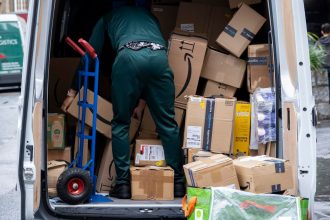Unlock the Editor’s Digest for free
Roula Khalaf, Editor of the FT, selects her favourite stories in this weekly newsletter.
The UN’s top court has ordered Israel to “immediately halt” its military offensive in Rafah, the southern Gazan city that had become a refuge for more than 1mn civilians since the war between Israel and Hamas erupted last year.
Despite intense international pressure to refrain, Israeli forces entered the city earlier this month, with officials insisting the assault was necessary to defeat Hamas, which triggered the war with its October 7 attack on Israel.
However, in an order issued in response to an urgent request brought by South Africa, the International Court of Justice on Friday said conditions in Rafah were “disastrous”, and instructed Israel to stop.
The court also ordered Israel to reopen the Rafah crossing between Gaza and Egypt to allow “unhindered provision at scale of urgently needed basic services and humanitarian assistance”, and to allow investigators into the enclave.
The ICJ has no way of enforcing its orders — Russia continues to flout the court’s 2022 order to suspend its military operations in Ukraine. But Friday’s order adds to intense international pressure on Israel over its war in Gaza, which has fuelled a humanitarian catastrophe in the enclave.
Israel’s Prime Minister Benjamin Netanyahu was due to discuss the order with senior officials on Friday, his office said.
Far-right finance minister Bezalel Smotrich said Israel would not agree to stop the war in Gaza. “Those who demand that the State of Israel stop the war, demand that it decree itself to cease to exist,” he wrote on the social media platform X. “If we lay down our weapons, the enemy will reach the beds of our children and women throughout the country.”
But internationally, the pressure to end the war is growing.
The EU’s chief diplomat said the ICJ’s ruling on Friday would force the bloc to choose between supporting “rule of law [or] . . . Israel”.
“We will have to choose between our support for international institutions and the rule of law, and our support for Israel,” Josep Borrell told a conference in Florence, adding that either choice was “going to be quite difficult”.
“We’ve been clear and consistent on our position on Rafah,” a spokesperson for the White House’s National Security Council told the Financial Times, when asked about the US response to the ICJ ruling. The US has opposed Israel’s full invasion of Rafah without a plan to protect civilians.
On Monday the prosecutor of the International Criminal Court — which deals with crimes by individuals rather than states — sought arrest warrants for Netanyahu and defence minister Yoav Gallant, and three Hamas leaders, saying he had “reasonable grounds to believe” they were responsible for alleged war crimes.
On Wednesday, Spain, Norway and Ireland pledged to recognise a Palestinian state next week. Spain’s Prime Minister Pedro Sánchez said that while Israel had a right to defend itself, its assault on Gaza, which has killed more than 35,000 people, according to Palestinian officials, was putting a two-state solution “in danger”.
Netanyahu dismissed the ICC prosecutor’s move as “a distortion of reality” and insisted Israel would continue its offensive in Gaza — which it launched in response to Hamas’s October 7 attack, during which militants killed 1,200 people, and took another 250 hostage, according to Israeli officials — regardless of international criticism.
Gallant on Thursday said Israel was stepping up its assault on Rafah, and that 1mn civilians had left the city since Israel began its operation there on May 7.
Heavy Israeli air strikes were reported in Rafah in the wake of the ICJ ruling on Friday, according to Palestinian eyewitnesses and social media; Israeli analysts speculated the target was the Hamas brigade commander for the area.
South Africa’s request is part of a case it brought last year alleging Israel is committing genocide against Palestinians in Gaza. Israel has vehemently denied the charges, and the ICJ is unlikely to issue a final decision in the case for years.
But the court has twice issued interim orders in the case. In January, it told Israel to comply with international law on genocide, and in March, to ensure more food and humanitarian assistance reached Palestinians in Gaza, warning that famine was “setting in”.
Israel does not recognise the ICC. But it is a member of the ICJ, and as such is meant to implement its orders.
Read the full article here




